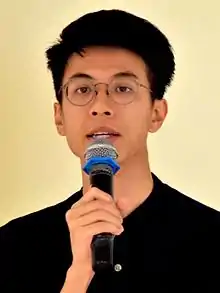Ray Wong
Ray Wong Toi-yeung (Chinese: 黃台仰; born 15 September 1993) is a Hong Kong activist. He founded the localist group Hong Kong Indigenous with other activists who were dissatisfied with the efficacy of Hong Kong's mainstream democratic movement during the 2014 Hong Kong protests. He took an active part in the Mong Kok civil unrest on Lunar New Year's Day (8 February) 2016 and was arrested later that month.
Ray Wong | |
|---|---|
黃台仰 | |
 | |
| Convenor of Hong Kong Indigenous | |
| In office January 2015 – October 2016 | |
| Personal details | |
| Born | 15 September 1993 British Hong Kong |
| Political party | Hong Kong Indigenous |
| Education | Bachelor |
| Alma mater | University of Göttingen |
| Occupation | Interior designer |
| Known for | 2016 Mong Kok civil unrest |
| Ray Wong | |||||||||
|---|---|---|---|---|---|---|---|---|---|
| Traditional Chinese | 黃台仰 | ||||||||
| |||||||||
Early life and career
He was born in Hong Kong in 1993 and studied at the Tang Shiu Kin Victoria Government Secondary School and the Caritas Bianchi College of Careers and worked as a freelance interior designer.[1]
In October 2019, he started his study at the University of Göttingen in political science and philosophy.[2]
Founding of Hong Kong Indigenous
Wong participated in the 2014 Hong Kong protests which is often dubbed the "Umbrella Revolution". Wong witnessed use of excessive violence by the police on unarmed citizens during the protests.[1] Wong believes use of force is justified to prevent violence from police.[1] After the protests, he formed Hong Kong Indigenous, a localist group, with other young protesters he met in Mong Kok who shared disappointment at the failure of the protests and disaffection with its leaders.[1]
Hong Kong Indigenous continued to organise and participate in other social movements, notably the anti-parallel trading protests in 2015, including the "Liberate Sheung Shui" on 24 January, "Liberate Tuen Mun" on 8 February and "Liberate Yuen Long" on 1 March. He was arrested five times in relation to those protests.[1]
Wong is ofter seen to be anti-Mainland immigrant and that the influx of mainland immigrants is undermining Hong Kong culture and abusing the Hong Kong welfare system. He has also stated, however, that he would regard an immigrant as a Hongkonger if he is willing to defend Hong Kong, its culture and values.[1] He often cites Benedict Anderson's book Imagined Communities to explain his vision of "Hongkonger" identity.[1]
Wong also advocates for Hong Kong's right to self-determination, and is viewed as a separatist by the pro-Beijing camp.[1]
Mong Kok conflict
In the Mong Kok civil unrest on Chinese New Year's Day 2016, Wong took an active role as Hong Kong Indigenous called for actions online to protect street hawkers from law enforcement officials. The protests turned into violent clashes. After the clashes, he posted a recording online saying that he was unsure what will happen to him, and it might be his “final message”. He called Hong Kong people to continue protesting and make a difference, and concluded by quoting a Chinese saying: "Rather be a shattered vessel of jade than an unbroken piece of pottery."[3]
On 11 February, police raided Wong's home in Tseung Kwan O but did not find him there. Subsequently, Wong disappeared from all media contact.[4] He was arrested at a friend's residence in Tin Shui Wai on 22 February and charged the next day with riot and, on 28 June, with incitement to unlawful assembly and incitement to riot.[5] He was charged for instigating riot, joint incitement and inciting others to take part in an unlawful assembly.
Protection in Europe
In November 2017, Wong failed to report to the police and return his travel documents to the court on 22 November after a judge-approved trip to Europe on condition of a HK$100,000 cash bail. The High Court issued an arrest warrant. [6]
Wong was granted refugee protection in Germany in May 2018 together with Alan Li Tung-sing at a time when Hong Kong's protection for free speech and assembly and fair trials have diminished.[7] Germany offers refugee protection to those being persecuted because of nationality, religion, political opinion or for belonging to a certain social group. He is the first British national granted asylum in the European Union.[8]
See also
References
- "新聞人物:誰是黃台仰?". BBC. 11 February 2016.
- https://www.hna.de/welt/hongkong-deutschland-goettingen-aktivist-ray-wong-zr-13650981.html
- Cheng, Kris (11 February 2016). "'Final message' from leader of localist group in Mong Kok protest calls for perseverance". Hong Kong Free Press.
- Wong, Hermina (2016-02-12). "Leader of localist group linked to Mong Kok unrest falls off radar after 'final message'". Hong Kong Free Press. Retrieved 2016-02-23.
- Cheung, Eric (2016-02-22). "Police find 'explosive material', 'weapons' as Ray Wong is arrested". Hong Kong Free Press. Retrieved 2016-02-23.
- "Where is Ray Wong, the alleged Mong Kok riot instigator?". South China Morning Post. 1 December 2017.
- "In a Possible First for Hong Kong, Activists Wanted by Police Gain Protection in Germany". New York Times. 21 May 2019.
- "Ray Wong & Alan Li Tung-sing granted refugee protection in Germany (【黃台仰、李東昇獲德國難民庇護)". i-CABLE News Channel. 22 May 2019.